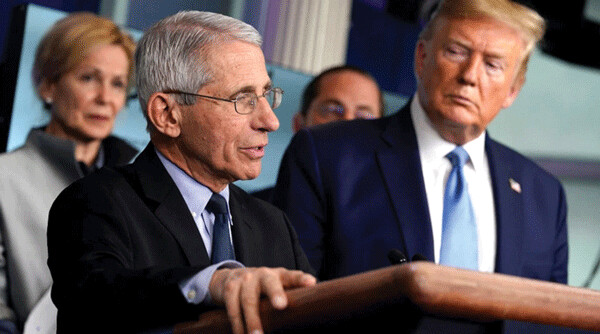Testing, triage and tragedy: The Trump pandemic

NEW YORK CITY - An eerie silence pervades the city, punctuated by the wail of ambulance sirens. Streets and sidewalks, which normally would be crowded with New Yorkers heading to restaurants and theaters, are now vacant. This is the epicenter of the COVID-19 pandemic in the United States. There are over 65,000 confirmed cases nationally, and around 1,000 coronavirus deaths. New York State has over 30,000 of those confirmed cases, with at least 18,000 of those in New York City alone. These New York numbers double every three to four days. The pandemic is ripping through New York, exponentially. The numbers are a gross underestimate caused by the egregious shortage of tests nationwide.
In New York City, makeshift hospitals are quickly being cobbled together at places like the sprawling Javits Convention Center, while frontline health care workers are scrambling to find personal protective equipment, so they don't get infected while caring for others. This city of over 8 million souls, its economy shuttered and its clinics, hospitals and intensive care units already near capacity, is bracing for a massive surge of patients.
On Tuesday, New York Gov. Andrew Cuomo blasted President Donald Trump, saying at a news briefing: "FEMA is sending us 400 ventilators ... What am I going to do with 400 ventilators, when I need 30,000? You pick the 26,000 people who are going to die!" Under pressure, Vice President Pence promised Cuomo an additional 2,000 ventilators from the more than 16,000 held in the national strategic reserve. Cuomo said New York will attempt to hook multiple patients up to single ventilators. One early national estimate predicted there would be eight patients needing ventilation for each available ventilator, leaving many to die.
Over 140 million Americans are under "stay at home" orders, hundreds of thousands of businesses are closed down or working at a fraction of their normal capacity. Millions are out of work, crashing state unemployment claim websites. Families are separated, with many vulnerable elderly relatives in locked-down senior citizen facilities in a desperate attempt to prevent the death sentence of coronavirus exposure.
On Tuesday, which was, at the time, the deadliest day of the pandemic so far in the United States, Donald Trump said on the Fox News Channel that he wanted the country "raring to go by Easter," adding later, "You'll have packed churches all over our country. I think it would be a beautiful time." Packed churches? At a time when the pandemic is widely predicted to be worse than it is now?
Dr. Anthony Fauci, the nation's top infectious disease doctor who is often at Trump's side at press briefings, told Science Magazine, describing his inability to correct Trump's many lies and misstatements, "I can't jump in front of the microphone and push him down."
Someone with a deeper understanding of Easter than Trump has, and likely more knowledge of COVID-19, is Pope Francis, who now holds his weekly mass before an empty St. Peter's Square in Rome. Italy has the highest number of deaths from the pandemic, with over 7,500, and the country's 60 million residents remain under mandatory lockdown. The Vatican just issued instructions to its clergy globally to hold Easter mass "without the presence of the people," encouraging parishioners to "prayerfully unite themselves in their homes."
The World Health Organization warned that the United States could soon become the pandemic's global epicenter. Widespread testing, isolation of those infected and protection of health care workers are all essential to turn the tide. The months' delay in making tests available in the U.S., the ongoing lack of testing and the time it takes for those who are tested to get their results have jeopardized the health of the entire U.S. populace.
On the front lines, nurses, doctors and support staff are treating this tsunami of COVID-19 patients, alongside their normal patient population as well. Staff are forced to reuse face masks over and over again, which, under normal circumstances, would be a fireable offense. Sean Petty, an emergency room nurse in the Bronx, said on the Democracy Now! news hour, "When we reuse it, we potentially contaminate ourselves, and then we're putting other patients at risk."
When asked what gives him the courage to go in every day, despite the enormous risk that health care workers have of getting infected themselves, Petty said: "A sense of duty to my patients. If we don't show up, if we're not there, nobody else is going to be ... What undermines morale for us is that our government doesn't have our back, that the Trump administration and the federal authorities have done virtually nothing."
(c) 2020 Amy Goodman and Denis Moynihan Distributed by King Features Syndicate
